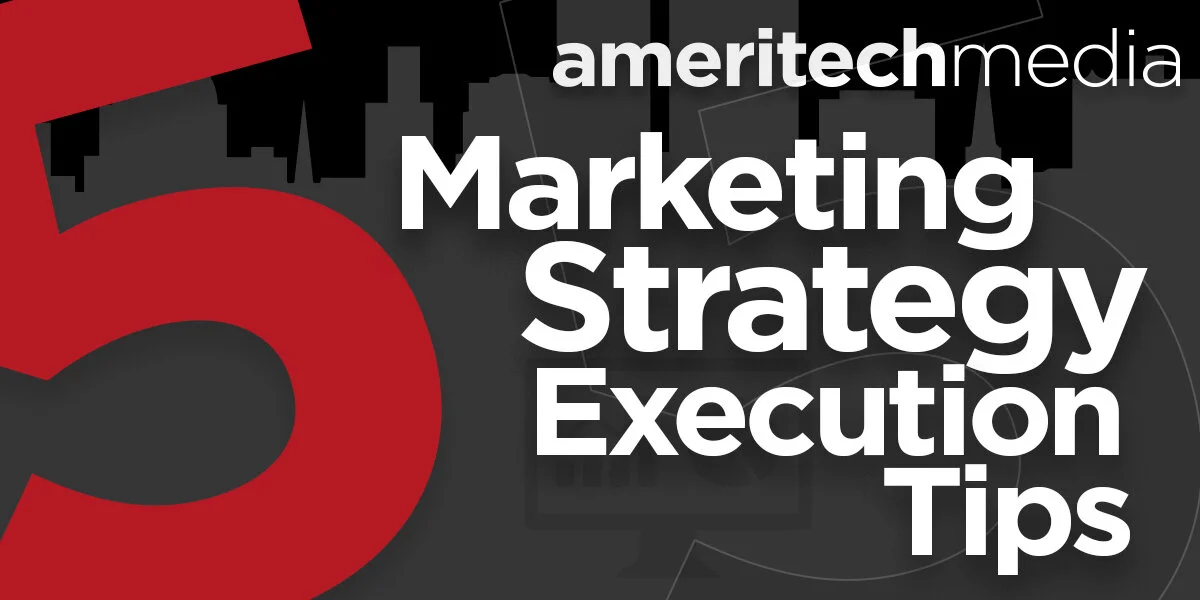Execute Your Marketing Strategy
1. Set Realistic Goals and KPIs
It’s exciting to think about the future and plan lofty goals but make sure you aren’t biting off more than you can chew. Take a look at your previous marketing campaign results and business growth and take them into consideration when planning future campaign goals. Setting unrealistic goals can lead to not only failed campaigns but also self-doubt when creating new ones. To set realistic goals, take your five or ten year goals and break them into yearly or even quarterly goals and make sure they align with your overall strategy. To begin defining your goal, ask yourself: What are we hoping to achieve, both short-term and long-term? Common business goals include building brand awareness, generating new leads, increasing sales, launching a new product or service, or enhancing customer relationships. Once you have realistic goals outlined, you need to identify how you are going to measure success, your Key Performance Indicators (KPIs). What does success of a particular goal look like to you and your organization? It may be “increase Facebook followers by 10%”, “improve our customer reviews and feedback”, or “increase revenue by 7%”. Knowing what your specific goals are and how you plan to measure their success helps keep you on target and ensure the success of your marketing strategy.
2. Know Your Target Audience
Have you built out a Client Persona? Do you know who your Target Audience is? And no, you can’t just say “everyone”. A Client Persona tells the story of an imaginary person that embodies your dream customer. Where do they shop? What do they value? How old are they? What are their pain points? Knowing everything about the consumer you are hoping to attract helps laser-focus your marketing efforts and ensure a successful marketing strategy. Building this profile or persona allows you to know not only where to target them (Facebook, Linkedin, Forbes magazine, traditional print advertising, etc.) and how to craft your message to ensure you are speaking their language and appealing to their interests and pain points. Keeping your target audience in mind at every stage of both strategy and execution will allow for a successful marketing campaign or product launch.
3. Don't Try To Do it Yourself
So much went into planning your marketing strategy and the same time, care, and attention should be given to executing all of your hard work. We can’t all be experts in everything and various departments within an organization have different goals and values. Outsourcing the execution of your marketing strategy allows you to take a step back and worry about running your business, rather than the marketing aspects. Experts in the marketing, advertising, and consumer insights field are able to remain unbiased and bring your strategy to fruition with years of industry experience. Outsourcing also allows better interconnectivity between departments rather than the marketing efforts to live solely in your internal marketing department.
4. Create Standardized Workflows
Most businesses have several marketing campaigns going on simultaneously depending on their size. Making your process repeatable and standardizing your workflow allows your team to execute your strategy efficiently and effectively every time, no matter who is managing the efforts. Knowing and laying out each step in the process provides consistency and promotes confidence in both the marketing and leadership teams.
5. Measure, Rinse, Repeat
The market is always changing and so should your strategy and marketing initiatives. Reviewing your strategy, goals, and measuring results continually allows you to stay current with consumer trends, see what is working and what isn’t, and enables you to adjust accordingly to maintain your competitive advantage. Marketing with a “set-it and forget-it” mindset is a surefire way for your plans to fail. As the market and consumer landscape changes, so should your goals and marketing strategies. Practicing agile marketing and staying up to date on modern marketing practices and marketing technology is a must in today’s world. Measure those KPIs, your marketing budget, and your ROI monthly and quarterly and adjust campaigns accordingly to ensure success.





